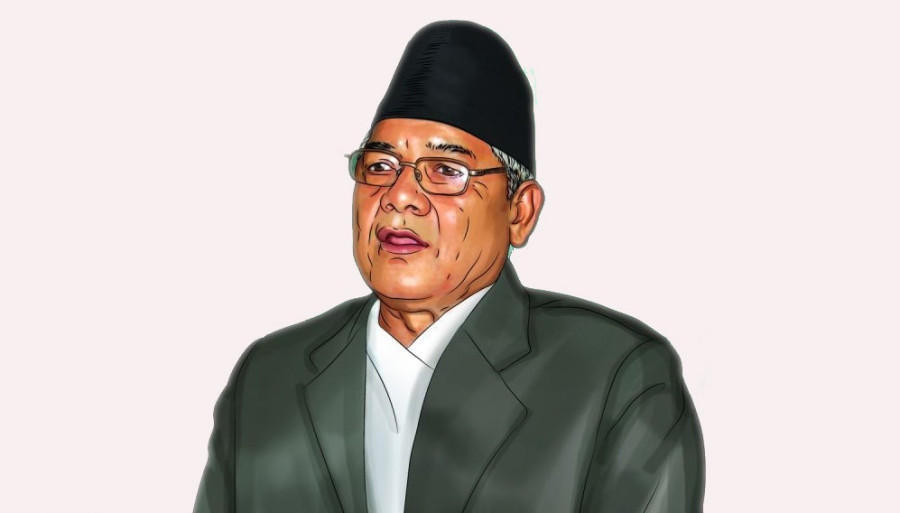National
Supreme Court blocks Bamdev Gautam’s way to Cabinet for now
Responding to a writ against Gautam’s nomination to the National Assembly, Justice Ananda Mohan Bhattarai has ordered not to give any additional constitutional positions to him.
Tika R Pradhan
The prospects of Bamdev Gautam, who was recently nominated to the National Assembly by the President, of becoming a minister have been thwarted, at least for now.
A single bench of Justice Ananda Mohan Bhattarai on Wednesday issued an interim order, asking the authorities not to give Gautam any additional constitutional responsibilities for now.
The order came in response to a writ filed by Dinesh Tripathi, a senior advocate, in which he had demanded that Gautam’s appointment as a member of the National Assembly be annulled and that the authorities be ordered not to give any constitutional responsibility to him.
The bench has taken cognizance of the case as first of its kind since the adoption of the new constitution and said the petition has given rise to the possibility of “serious constitutional explanation”.
“Until a further interim order, put the issue on hold,” the bench has observed.
Gautam was appointed to the upper house of federal parliament by President Bidya Devi Bhandari on September 17 as per the recommendation of the government.
The Cabinet, on September 14, had decided to recommend to the President that Gautam be appointed a National Assembly member as per the September 3 decision of the ruling Nepal Communist Party.
Guatam, who was appointed the vice-chair of the Nepal Communist Party (NCP) in February after amending its statute, had lost 2017 parliamentary elections from Bardiya Constituency 1.
Gautam’s appointment to the National Assembly has met with criticism from several quarters because experts and analysts say taking a person rejected by the people to the upper house is tantamount to undermining democratic principles.
In his petition, advocate Tripathi said that Gautam’s nomination is against the constitution. Tripathi has made the Office of the President, Office of the Prime Minister and Council of Ministers, chairman of the National Assembly, the Nepal Communist Party and Gautam as defendants.
The bench has scheduled another hearing for September 30.
Though Gautam is not the first person to reach the National Assembly despite losing the elections, the route through which he was taken to the upper house has given rise to some constitutional questions.
Earlier on March 4, Narayan Kaji Shrestha took the oath as a member of the Assembly. He too had lost the 2017 elections from Gorkha Constituency 2. He, however, was fielded by his Nepal Communist Party from Gandaki Province for the National Assembly. Though questions were raised against the ruling party’s move to field a person who had lost the election, the matter had not reached the court.
Even as the constitution does not say anything explicitly on whether a person having lost the election can be elected or nominated to the Assembly, there is a lack of clarity when it comes to such a person becoming a minister.
Experts on constitutional affairs have their opinions divided on whether persons like Gautam, who were rejected by the people, can become a minister.
Article 78 (4) of the Constitution of Nepal bars Gautam from going to the Cabinet for having lost the 2017 parliamentary elections, but Article 76 (9) may allow him to become a minister as he has already taken the oath as a member of the Assembly.
Shrestha, who is also the spokesperson for the ruling Nepal Communist Party, refused to comment on the Supreme Court’s order, saying Gautam’s lawyers will put forth their views during the next hearing on September 30.
“We don’t have any comments on behalf of the party,” said Shrestha. “Defendants in the case would put forth their views before the bench on the set date.”
The ruling party has decided to defend Gautam in the court as regards the writ against the party’s decision to recommend the President that she appoint Gautam as a National Assembly member. For the government, which made the recommendation, the Office of the Attorney General will argue on Gautam’s behalf.
Gautam was nominated to the lone vacant seat in the National Assembly after Yubaraj Khatiwada's two-year term ended on March 3.
Nepal Communist Party chair and Prime Minister KP Sharma Oli, whose position had become tenuous amid growing pressure from the faction led by the other chair—Pushpa Kamal Dahal—to resign, had agreed to take Gautam to the Assembly.
In the nine-member Secretariat of the ruling party, whichever side Gautam stayed had become crucial, as the Oli and Dahal factions had four members each in their camps.
Claiming that Gautam’s appointment violates the spirit of the constitution and obstructs the constitutional process, advocate Tripathi had demanded an interim order not to implement the decision.
While appealing for ensuring a standard for the people who are nominated to the upper house, Tripathi has also demanded an interim order to stop Gautam’s appointment as a minister.
“I have also demanded the Supreme Court direct the government to set the criteria for the people who are appointed by the President to the upper house,” said Tripathi.
As per constitutional provisions, the President nominates three members to the 59-member National Assembly, including a woman, on the recommendation of the Council of Ministers.
The President had appointed Ram Narayan Bidari, Bimala Rai Poudyal and Khatiwada to the National Assembly in 2018 as per Article 86 2(b) which states that three members consisting of at least one woman should be nominated by the President on the recommendation of the government.
Such appointees serve staggered terms of two, four or six years as determined by a lottery. Since Khatiwada had drawn a token for two years, his tenure ended on March 3. Since then, one seat had been vacant in the National Assembly.




 19.12°C Kathmandu
19.12°C Kathmandu














